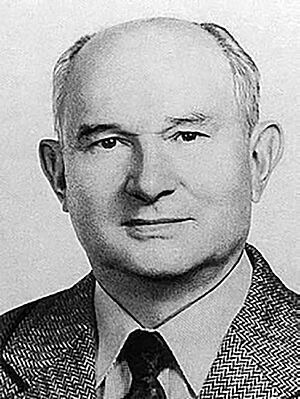Dmitri Polyakov facts for kids
Quick facts for kids Dmitri PolyakovДмитрий Поляков |
|
|---|---|
 |
|
| Allegiance | |
| Rank | Major General |
| Codename(s) | BOURBON, ROAM, TOPHAT |
|
|
|
| Born | 6 July 1921 Ukrainian SSR, Soviet Union |
| Died | 15 March 1988 (aged 66) Russian SFSR, Soviet Union |
| Cause of death |
Execution by shooting |
| Nationality | Soviet |
| Children | 3 (1 predeceased) |
Dmitri Fyodorovich Polyakov (Russian: Дмитрий Фёдорович Поляков; 6 July 1921 – 15 March 1988) was a high-ranking officer in the Soviet military intelligence agency, the GRU. He became a Major General during the Cold War. Polyakov secretly worked as a double agent for the United States, providing valuable information to the CIA and the FBI. He was known by the code names BOURBON, ROAM, and TOPHAT. Polyakov was arrested in 1986 and later executed in 1988.
Contents
Early Life and Military Career
Dmitri Polyakov was born in Soviet Ukraine in 1921. His father was a bookkeeper. In June 1941, he finished Sumy Artillery School. He then served as an artillery officer during World War II and was recognized for his bravery.
After the war, Polyakov studied at the M. V. Frunze Military Academy. He also took special courses for the GRU. The GRU was the Soviet Union's foreign military intelligence agency. Polyakov joined the GRU and began his career as a spy.
His first overseas job was with the Soviet team at the United Nations. This was from 1951 to 1956. During this time, he led a group of Soviet spies. Later, he worked in Rangoon (1965–1969) and New Delhi (1973–1976 and 1979–1980). In these places, he was the Soviet Military Attaché. This means he was a military expert working at the Soviet embassy.
A Double Agent's Secret Life
In 1959, while on his second assignment in New York, Polyakov secretly contacted the FBI. He offered to work for them as an informant. Polyakov said he was a loyal Russian. He explained he was upset with the corruption within the Communist Party. He felt he needed to help the United States. He believed the Soviets might win the Cold War, and he didn't want that to happen. Some also believe his decision was influenced by his son's serious illness.
Some experts, like former CIA officer Tennent H. Bagley, had a different idea. They thought Polyakov might have been a "triple agent" at first. This would mean he was pretending to spy for the U.S. but was actually still working for the Soviet Union. However, later, Bagley believed Polyakov truly switched sides. He thought Polyakov started spying for the CIA in 1965.
About a year after contacting the FBI, Polyakov returned to Moscow. There, he could access GRU documents. This allowed him to identify other secret agents. He helped expose Frank Bossard, a British missile researcher, and Jack Dunlap, an American Army Sergeant.
In the late 1960s, Polyakov was in Rangoon. He gave the CIA all the GRU's information on the Vietnamese and Chinese militaries. He also shared details about the growing split between the Soviet Union and China. This information was very important. It later helped Henry Kissinger and Richard Nixon improve relations with China in 1972.
Polyakov continued to spy for the CIA until 1980. He was then called back to Moscow from New Delhi. After that, the CIA lost contact with him.
Arrest and Execution
Dmitri Polyakov was arrested by the KGB in 1986. This was six years after he retired from the GRU. For a long time, his contacts at the CIA did not know what had happened to him. Later, it became clear that he might have been betrayed. Two other spies, Robert Hanssen (from the FBI) and Aldrich Ames (from the CIA), were working for the Russians. They may have revealed Polyakov's secret. In 1988, Polyakov was found guilty of treason and was executed.
Polyakov's Legacy
Polyakov was a CIA informant for 25 years. During this time, he rose through the ranks to become a general. CIA officers speak very highly of the information he provided.
CIA officer Jeanne Vertefeuille said he didn't spy for money. He wanted to stay in his position to help the U.S. She called losing him a "bad day." Polyakov only asked for $3,000 a year. He often took this payment in the form of tools, fishing, and hunting gear.
Sandy Grimes, another CIA officer, called Polyakov "the best source" American intelligence ever had. She said he was a man of "tremendous courage." She also noted that because of people like him, the Cold War ended, and the Soviet Union broke apart.
Former CIA director James Woolsey called Polyakov "the jewel in the crown." He said Polyakov's actions helped the West win the Cold War. He also said it kept the Cold War from becoming a "hot" war, meaning a real military conflict.
Polyakov provided several key pieces of information:
- He showed there was a serious disagreement between the Soviet Union and China. This helped President Nixon open diplomatic relations with China in 1972.
- He gave technical details about Soviet-made antitank missiles. This knowledge was very useful when Iraq used these weapons in the Gulf War.
- He proved that British intelligence official Frank Bossard was secretly working for the USSR.
See also
 In Spanish: Dmitri Poliakov para niños
In Spanish: Dmitri Poliakov para niños
- Maria Dobrova – Soviet military intelligence officer

